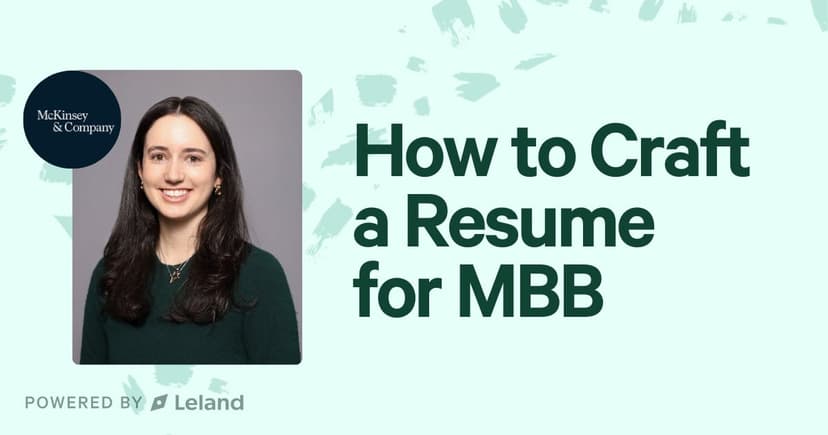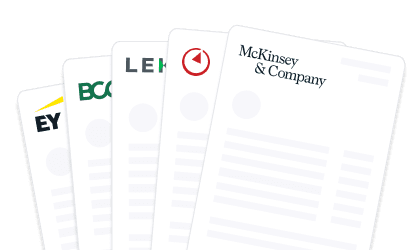Top 5 Tips on Breaking Into Consulting (From an Ex-Bain Interviewer)
Discover the step-by-step guide to breaking into consulting! Learn how to build a strong academic foundation, gain practical experience, master interviews, and network effectively to secure your dream consulting role. Perfect for aspiring consultants at any stage.

By Sam A.
Bain & MBB Consulting Recruiting, from resume to final rounds!
Posted August 27, 2025

Join a free event
Learn from top coaches and industry experts in live, interactive sessions you can join for free.
Table of Contents
Hi, I’m Sam A., a Leland coach and expert in the consulting application process. I led a school recruiting team for multiple cycles during my time at Bain & Co. and participated in dozens of interviews across multiple schools. Below are my top tips for students interested in management consulting.
Though they may feel a bit broad, I’ve seen the students who apply them in unique and personalized ways see great success. Adopting a broader approach can help aspiring consultants explore various opportunities before specializing.
How to Get Into Consulting?
Getting a consulting job is competitive, but it’s possible if you follow the right steps. Consulting firms look for people who can solve problems, work well in teams, and communicate clearly. They also want candidates with a strong academic background, real-world experience, and a clear reason for wanting the role. Investigating a consultant's background and experience is crucial to ensure they are adequately qualified for a project. Whether you’re still in college, in business school, or changing careers as an experienced hire, this article will walk you through what works. These tips are based on real experience from hiring at top consulting firms. If you’re serious about a consulting career, start by learning what firms expect. Most large firms, like McKinsey, Bain, and Boston Consulting Group, hire people who show strong problem-solving skills, strong communication skills, and a track record of leadership. They want to see that you’ve done the work to prepare and that you understand what the job involves.
This guide is built for aspiring consultants at different stages. Whether you’re applying for a summer internship, coming from graduate school, or working in a niche area and planning a career switch, the steps below will help you build a strong application, improve your interview performance, and connect with people in the industry. Consulting firms provide tailored business solutions that significantly impact various businesses, making it essential to choose the right firm for effective strategy implementation.
Read: The 10 Best Consulting Coaches
Step 1: Build a Strong Academic Foundation
Most consulting firms look closely at your educational background. They often recruit from top schools and prefer candidates with strong grades, clear thinking, and experience in analytical fields. A good academic record can help you pass the first screening and shows that you’re ready for the problem-solving work consultants do every day.
Choose the Right Degree Program
Your choice of degree program can significantly influence your candidacy for consulting jobs. While consulting firms welcome diverse academic backgrounds, certain fields of study tend to align well with the skills required for consulting roles.
Undergraduate majors that help:
- Business, economics, math, engineering, or computer science
- These programs improve your data analysis, logic, and problem-solving skills
- Look for courses like finance, operations, statistics, and programming
Graduate programs that help:
- MBA programs at business schools like Harvard, Wharton, and INSEAD often lead directly to interviews with top consulting firms.
- Master’s and PhDs in engineering, life sciences, or data science are valuable for roles in healthcare, tech, or analytics consulting.
Focus on High Academic Performance
Consulting firms often use academic performance as a proxy for intellectual rigor and discipline. A strong GPA not only strengthens your resume but also helps you pass the initial screening. Additionally, skills like analytical and interpersonal abilities are highly valued by consulting firms.
Tips for Maintaining a High GPA:
- Strategic Course Selection: Choose a mix of challenging and GPA-friendly courses to balance academic rigor with performance.
- Time Management: Develop a study schedule that prioritizes deadlines and avoids last-minute cramming.
- Leverage Resources: Take advantage of office hours, tutoring programs, and study groups.
Balance Grades with Extracurricular Involvement:
- Consulting firms value well-rounded candidates. Leadership roles in student organizations or participation in case competitions demonstrate time management and leadership abilities.
- For example, serving as president of a finance club or organizing a campus consulting project shows initiative and teamwork.
Build Analytical and Problem-Solving Skills
These skills are at the heart of every consulting job. You’ll use them in case interviews, client meetings, and team discussions.
Good courses to take:
- Data analysis using Excel, Tableau, or R
- Economics, finance, and operations
- Critical thinking or logic courses in philosophy or computer science
Other ways to build these skills:
- Join case competitions to practice solving complex problems
- Do research or side projects that involve structured thinking
- Get professional certifications in data or project management (CAPM, PMP, Google Data Analytics)
Read: How to Succeed in a Consulting Career - An Expert Coach's Guide
Academic Paths That Work in Consulting
| Degree Level | Common Fields | Why It Helps |
|---|---|---|
| Undergraduate | Business, Economics, STEM | Helps with consulting applications and early internship roles |
| MBA Programs | Business Administration | Leads to interviews at top firms and often summer offers |
| Advanced Degrees | Engineering, Life Sciences, Data Science | Useful for niche areas like healthcare or analytics |
Go to a School With Consulting Access
Some firms focus their recruiting on certain schools. These schools usually have more networking events, resume drops, and consulting-focused clubs.
Examples:
- Ivy League schools (Harvard, Yale)
- Top MBA programs (Stanford, Wharton)
- Global business schools (INSEAD, LBS)
How to make the most of your school:
- Research Recruiting Trends: Use online forums, alumni networks, and career offices to identify target schools for your desired firms.
- Leverage Alumni Connections: Alumni at top firms can guide you through the application process and provide insider advice.
- Join Consulting Clubs: Many schools have consulting-focused student groups that offer case workshops and networking opportunities.
Step 2: Gain Practical Experience
Top consulting firms want more than just good grades. They look for candidates who show they can solve problems, lead teams, and get results in real work settings. Practical experience gives you proof of that. It also helps you build a strong resume and stand out during the interview process.
Get a Consulting Internship
A consulting internship gives you real exposure to the work consultants do. It also increases your chances of getting a full-time offer. Firms like McKinsey, Bain, and Boston Consulting Group offer summer internships to both undergrads and MBA students. Preparing thoroughly for interviews and negotiations following a job offer is crucial to securing a full-time position.
How to land and succeed in a summer internship:
- Apply early – Most firms have set timelines. Follow application deadlines closely.
- Prepare for case interviews – These are used in almost every consulting interview. Practice often.
- Use networking events – Talk to alumni and consultants at firm-sponsored events.
- Do well on the job – Volunteer for work, show attention to detail, and stay organized. Many interns receive full-time job offers after.
Read: Management Consulting Internships: How to Land One (With Timeline & Tips)
Seek Industry-Specific Roles
Consulting firms value candidates with expertise in particular industries, as this knowledge is directly transferable to consulting engagements. For example, if a consulting firm works heavily with healthcare clients, prior consulting experience in healthcare management is a strong asset. Additionally, having prior experience can provide a strong foundation for entering the consulting field and guide individuals toward specializing in areas where they have both experience and interest, thereby enhancing their credibility and expertise.
Examples of Industry-Specific Roles:
- Technology Sector: Roles like business analyst, data analyst, or project manager in tech companies prepare you for consulting projects in the tech industry.
- Finance and Banking: Experience in investment banking, risk management, or financial analysis equips you with insights into financial consulting.
- Healthcare: Working in hospital administration or pharmaceutical companies provides valuable domain expertise for healthcare consulting.
- Sustainability: Roles in ESG (Environmental, Social, and Governance) consulting or renewable energy firms can lead to specialized consulting opportunities.
How Industry Roles Add Value:
- Offer real-world exposure to solving business problems in a specific field.
- Help you understand the language, challenges, and operations unique to that industry.
- Allow you to demonstrate transferable skills, such as data analysis, strategic thinking, and problem-solving.
Develop Leadership Skills
Leadership is a cornerstone of a consulting career, where team management and client interactions are everyday responsibilities. Demonstrating leadership experience shows that you can take initiative, manage responsibilities, and drive outcomes. Consulting firms place a heavy emphasis on teamwork and collaborative work environments to promote professional growth and community among employees.
Ways to Build Leadership Experience:
Student Organizations:
- Lead a consulting club or professional organization at your school.
- Organize events, manage budgets, or oversee recruitment to showcase your ability to handle complex tasks.
Volunteer Opportunities:
- Manage projects for nonprofits or local organizations, such as improving their operations or fundraising strategies.
Professional Work:
- Assume leadership roles in your current job or internship, such as leading cross-functional teams or spearheading key projects.
Key Leadership Traits Consulting Firms Look For:
- Initiative: Proactively identifying opportunities for improvement.
- Collaboration: Fostering teamwork and achieving results as a group.
- Problem-Solving: Developing and implementing solutions in challenging situations.
- Resilience: Handling pressure and adapting to changing priorities.
What Experience Matters Most?
| Experience Type | Example | Why It Helps |
|---|---|---|
| Consulting Internship | Summer Analyst at Bain | Shows you can handle consulting work and deadlines |
| Industry Experience | Business Analyst in Tech | Builds domain knowledge and consulting experience |
| Leadership Roles | President of a Consulting Club | Proves you can lead teams and make decisions |
| Project Management | Leading a cross-functional team | Helps you run consulting projects and serve clients |
| Data Analytics | Analyst in Finance | Shows analytical skills and attention to detail |
Expert Tips for Gaining Experience
- Start Early: Seek internships and leadership roles during your sophomore or junior year of undergraduate studies or the first year of your MBA.
- Focus on Transferable Skills: Skills like analytical thinking, project management, and communication apply across industries and consulting projects.
- Use Side Projects: If you can’t secure a formal internship, create your own consulting projects. For example, help a local business optimize operations or improve its marketing strategy.
- Build a Portfolio: Document your experiences with measurable outcomes. For instance, “Reduced operational costs by 10% by streamlining workflows” is more impactful than vague descriptions.
Stand Out with Real Results
- Quantify your achievements – Using numbers on your resume (cost savings, revenue growth, hours saved).
- Seek out recommendations – Getting strong references from former managers or professors.
- Stay engaged post-experience – Keep in touch with people you worked with. They might help with referrals or expert feedback later.
Step 3: Create a Polished Application
Your application is the first thing potential employers see. Consulting firms receive thousands of applications, so your resume and cover letter need to show that you’re ready for the work, that you’ve developed the right skills, and that you understand what the job involves.
Customize Your Resume for Consulting Roles
A good resume is short, clear, and tailored to each consulting firm you apply to. It should highlight your consulting experience, problem-solving skills, leadership, and results. The top three strategy consulting firms, known as MBB, are commonly referred to for their prestige and influence in the consulting industry.
How to write a strong consulting resume:
- Use action verbs like “led,” “analyzed,” “improved,” or “managed.”
- Include data to show real results (example: “Increased revenue by 15% by launching a new pricing model”).
- Match your skills to what the firm looks for: data analysis, project management, teamwork, leadership, and strong communication skills.
- Make it specific to the firm’s focus industries or services.
Example resume lines:
- Summer Analyst at Bain & Company – Conducted competitor analysis that helped a retail client improve margins by 12%
- President, Finance Club – Led a team to host three business workshops for over 200 students
- GPA 3.9/4.0 – Relevant coursework: Business Strategy, Advanced Analytics, Project Management
Write a Clear and Direct Cover Letter
Your cover letter tells the firm why you’re applying and how your background fits the consulting job.
- A personal opening: Name the firm and role
- Show your match: Link your past roles to the consulting work they do.
- Explain why you’re interested in that firm’s culture, clients, or service areas.
- Keep it brief: 3 short paragraphs are enough.
Example phrasing:
- “As a former analyst in fintech, I developed the same analytical skills your consultants use when advising financial services clients.”
- “I admire how your team helps healthcare companies solve complex problems. That’s where I want to focus my consulting career.”
Use the Right Resume Format
| Section | What to Include |
|---|---|
| Education | Degree, GPA (if strong), business school or graduate school courses |
| Professional Experience | Past jobs, internships, consulting work, and measurable achievements |
| Skills | Technical and soft skills: Excel, Tableau, SQL, language skills, team projects |
Summer Analyst – Bain & Company
- Helped a Fortune 500 client design a growth strategy, contributing to a projected $10M in new revenue
- Built client-ready slide decks and presented findings to senior leadership
- Collaborated with other consultants to break down business problems into actionable steps
Expert Tips for Crafting a Standout Application
- Use action verbs – Start bullet points with strong verbs like "led," "analyzed," "streamlined," or "developed."
- Keep it concise – Limit your resume to one page for undergraduates and recent graduates; and two pages for experienced hires.
- Proofread meticulously – Typos or formatting inconsistencies can hurt your chances. Have a peer or mentor review your documents.
- Leverage feedback – Seek advice from alumni, career coaches, or mentors to refine your application materials.
Step 4: Master Consulting Interviews
Consulting interviews test your ability to solve problems, communicate clearly, and think under pressure. Most interviews include a case interview and a behavioral or “fit” interview. Both are used to see how you think and how well you’d work with clients and team members.
What to Expect in Consulting Interviews
1. Case Interviews
Case interviews simulate real consulting scenarios where candidates must solve complex problems or hypothetical business problems. This is the most critical part of the consulting hiring process. Continuous education and skill improvement are essential to stay ahead in the consulting industry.
Format:
- The interviewer presents a business problem, such as “How would you help a company increase profitability?” or “Should this company enter a new market?”
- You are expected to ask clarifying questions, develop a structured approach, analyze the situation, and propose actionable recommendations.
Skills Tested:
- Logical and analytical thinking.
- Creativity in finding solutions.
- Effective communication and structured thought processes.
Example Case Problem:
- Problem: A coffee chain is experiencing declining profits. How would you address the issue?
- Approach: Analyze revenue and cost drivers, identify market trends, and propose specific actions (e.g., renegotiating supplier contracts or introducing new product lines).
2. Fit/Behavioral Interviews
Fit interviews evaluate how well you align with the firm’s values, culture, and teamwork dynamics.
Common Questions:
- “Tell me about a time you worked in a team to solve a challenging problem.”
- “Describe a leadership experience and the impact you had.”
- “Why do you want to join [specific firm]?”
Skills Tested:
- Leadership, adaptability, and teamwork.
- Clear articulation of past experiences and lessons learned.
- Enthusiasm for the firm and consulting as a career.
Read: Consulting Interview Questions: Behavioral, Fit, and MBB Examples
Expert Tips for Success
1. Practice Case Studies
You can improve at case interviews with regular, focused practice.
Where to start:
- Use books like Case in Point or Crack the Case System
- Try online tools like PrepLounge or CaseInterview.com
- Do mock interviews with peers, alumni, or coaches
- Join case practice groups at your business school or university
Tip: Work on solving cases within the time limit and learn to structure your answers quickly.
2. Strengthen Your Problem-Solving Skills
Top consulting firms want people who can break down complex problems and find solutions. Learn how to think clearly and use simple frameworks.
Useful frameworks to study:
- SWOT Analysis (Strengths, Weaknesses, Opportunities, Threats)
- Porter’s Five Forces (to analyze industries)
- Profitability Framework (revenue and cost breakdown)
- Market Entry (size, competition, entry risks)
Example Approach:
Problem: A retailer wants to cut costs.
- Step 1: Ask what costs are fixed (like rent) and what are variable (like supplies)
- Step 2: Find areas to reduce spending without hurting sales
- Step 3: Recommend specific actions (better supplier contracts, reduce excess inventory)
3. Use the STAR Method for Behavioral Questions
STAR stands for:
- Situation – What happened?
- Task – What was your role?
- Action – What did you do?
- Result – What changed?
Example:
“Tell me about a time you improved something at work.”
- Situation: “At a startup internship, sales were flat.”
- Task: “I was asked to help figure out why.”
- Action: “I ran a funnel analysis, found drop-offs in outreach, and rewrote the sales pitch.”
- Result: “Sales increased by 25% in three months.”
4. Improve Your Communication Skills
Consultants talk to clients every day. Your answers need to be clear, confident, and well-structured.
- Speak in bullet points or lists
- Pause before answering tough questions
- Listen carefully to what the interviewer says and adapt as needed
- Avoid long-winded answers, get to the point
Read: How to Prepare For Your Management Consulting Interview
Practice Example: Case Interview
Prompt: A national airline has seen a drop in ticket sales. What would you do?
Step-by-step approach:
Clarify the goal: “Is the goal to increase revenue, reduce costs, or both?”
Explore the causes:
- External: Economy, travel trends, new competitors
- Internal: Prices, customer service, flight routes
Analyze:
- Are ticket prices too high?
- Are the right routes being offered?
- Is service affecting customer loyalty?
Make recommendations:
- Lower prices for low-demand times
- Improve the booking process
- Add more popular destinations
Step 5: Network Strategically
Many consulting jobs are filled through referrals and personal connections. A strong professional network can give you access to insider knowledge, help you learn about the consulting industry, and improve your chances of getting networking opportunities and interviews at a top consulting firm.
Why Networking Matters in Consulting
Firms like McKinsey, Bain, and Boston Consulting Group often hire people who already know someone at the company. Your network can help you:
- Understand the firm’s work and culture
- Get expert advice on the application process
- Receive referrals from other consultants or recruiters
- Hear about job openings before they go public
How to Build a Professional Network That Helps
1. Attend Events Hosted by Consulting Firms
Top firms host events to meet aspiring consultants and identify strong candidates. These events are a chance to ask questions, learn how the firm works, and make a good first impression. Creating a networking funnel can help you strategically build professional relationships by organizing and prioritizing your connections to effectively engage with key industry figures.
Events to attend:
- Campus presentations and firm-hosted coffee chats
- University career fairs and recruiting panels
- Webinars and virtual info sessions run by top consulting firms
- Workshops hosted by consulting clubs or business schools
Tip: Come with 1–2 specific questions and follow up with a short message after.
2. Use LinkedIn the Right Way
LinkedIn is one of the most useful tools for building relationships in the consulting industry.
Steps to connect:
- Look for consultants at your target firms, especially those from your school or with a similar background
- Send a personal message when connecting
- Ask clear questions about their role or their advice for the application process
Example question:
“I’m preparing for consulting interviews this fall and noticed you’ve been at [firm] for a few years. What helped you most when applying?”
Avoid: Vague outreach like “Can you tell me more about your job?”
3. Reach Out to Alumni
Alumni from your college or business school are often open to helping students and new grads. If they’re working at a large consulting firm, they may even be able to refer you.
How to reach out:
- Use LinkedIn or your school’s alumni directory
- Keep your message short and specific
- Ask for a quick call or to exchange a few messages
Good questions to ask alumni:
- “How did you prepare for case interviews?”
- “What do you wish you knew before applying to [firm]?”
- “What makes working at [firm] different from other consulting firms?”
Tip:* If the conversation goes well, keep in touch. Don’t ask for a referral right away; build the relationship first.*
Example Networking Conversation Starter
- Introduction: “Hi [Name], I’m [Your Name], a junior at [University] majoring in business administration. I’m currently exploring a career in consulting and am particularly interested in [Firm] because of its focus on [specific industry or value, e.g., healthcare innovation].”
- Question: “I’d love to hear about your experience working on consulting engagements. What do you think is the most rewarding part of your role at [Firm]?”
- Closing: “Thank you for taking the time to speak with me. Do you have any advice for someone preparing for the consulting recruiting process?”
Benefits of Strategic Networking
| Benefit | How It Helps |
|---|---|
| Insider Knowledge | Gain insights into firm culture, expectations, and recruiting processes. |
| Referrals | A referral from a consultant can significantly improve your application’s visibility. |
| Personalized Guidance | Get tailored advice on interviews, case preparation, and application strategy. |
| Building Confidence | Conversations with industry professionals help you feel more prepared and informed. |
Additional Tips for Success
- Develop specific skills – Consultants need strong analytical, communication, and problem-solving skills. Tools like Excel, PowerPoint, and data analysis software can set you apart.
- Understand consulting firms’ expectations – Research their values, company culture, and typical project types to align your preparation.
- Stay persistent – The consulting recruiting process is highly competitive. Rejections are common, but persistence and continuous improvement will pay off.
- Find your own clients – Consultants must proactively network and build a professional portfolio to find their own clients, which is crucial for independence and flexibility in their career.
Breaking Into Consulting
Getting a job at a consulting firm takes more than good grades. Top consulting firms want candidates who can solve complex problems, lead teams, and work well with clients. If you want to build a successful consulting career, focus on five key areas: strong academics, hands-on experience, a clear resume and cover letter, strong interview skills, and a reliable professional network. Show that you have the analytical skills, business knowledge, and a commitment to continuous learning to succeed in management consulting. Highlight your leadership, your track record, and how you’ve worked with others to get real results. Many candidates apply, but those who prepare well and connect with other professionals stand out.
Read: A Day in the Life of a Consultant – Monday to Friday
Work with Me
Need guidance to secure a consulting role? I’ve spent hundreds of hours helping students prepare for and navigate the consulting interview process across all three major firms. From the networking and clubs through to the final interview with the partners, I know the process. I've been in decision-making conversations and understand how factors are weighed against each other, even when there are multiple qualified candidates.
Work with me to refine your resume, perfect case interviews, and build strategies to stand out in the competitive recruiting process. With expert advice tailored to your goals, you’ll be better equipped to succeed at every stage.
Here are some Leland resources to get you started:
- How to Succeed in a Consulting Career - An Expert Coach's Guide
- The Ultimate Guide to the Consulting Case Interview – With Examples
- An Expert’s Guide to Resumes: 5 Tips to Make You Stand Out
- Best 30 Free Resources to Get Into Management Consulting
- How to Negotiate Your Salary - with Example Emails
- From No Offers to Multiple Offers: How to Take Your Casing to the Next Level
- How to Network for Management Consulting
FAQs
How do I get into consulting with no experience?
- Build transferable skills, join case competitions, and apply for internships or entry-level roles. Networking and a strong resume help. Additionally, utilizing job boards as a vital resource can help you find consulting positions and tailor your application materials to the job descriptions found on these platforms.
What qualifications do you need to get into consulting?
- Most firms look for a strong GPA, a relevant degree, leadership experience, and problem-solving skills.
What qualifications do I need to be a consultant?
- To become a consultant, you’ll need a bachelor’s degree at minimum, solid problem-solving skills, and experience working with clients or teams. Some consultants also hold professional certifications in areas like project management or data analysis.
How to begin a career in consulting?
- Start by learning what consulting firms expect. Build a strong resume with academic and professional experience that shows leadership, teamwork, and impact. Apply for internships, connect with consultants through networking events, and prepare for case interviews.

Written by Sam
5.0
(2)
I joined Bain as an intern out of undergraduate and stayed for nearly 5 years. While there, I worked heavily with recruiting, running a school team and interviewing across many core and non-core schools. There were a ton of great parts of working for Bain: I attended 4 BWCs (Bain World Cup), participated in the leadership team for our local chapter of Inspire (a non-profit consultancy), and was a regular coordinator of our office's unofficial ski trip. I’ve spent hundreds of hours helping students prepare for and navigate the consulting interview process across all three major firms. From the networking and clubs through to the final interview with the partners, I know the process. I've been in the decision-making conversations and understand how factors are weighed against each other, even when there are multiple qualified candidates. After leaving Bain I led a strategy team for a tech unicorn in Utah, and now work in Venture Capital. I am exceptionally grateful I started my career in consulting. It gave me the credibility and experience that launched me into leadership. I am originally from Salt Lake City and am happy to have found my way home. I am an avid sports fan (particularly college football) and love spending time in the mountains; hiking and running in the summer, skiing in the winter.
Sam has helped clients get into organizations like:
































